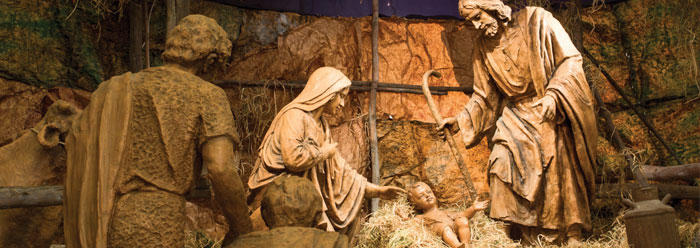We cannot fathom what it meant for the infinite Creator God to become finite man. Yet Jesus, who was "so much better than the angels" (Hebrews 1:4), willingly emptied Himself and, setting aside certain outward features of His deity, stooped from the glory of heaven's throne, took on "the form of a servant, and was made in the likeness of men" (Philippians 2:7). Thus, the King of heaven allowed Himself to be "made a little lower than the angels" (Hebrews 2:9), and taking on "the likeness of sinful flesh" (Romans 8:3), He "became obedient unto death, even the death of the cross" (Philippians 2:8). In this way, God mercifully showed His great love for us by giving us "his Son to be the propitiation for our sins" (1 John 4:10).
This most special gift is the reason we celebrate Christ's birth on Christmas Day, and it is especially appropriate that we remember the greatest of all verses during the Christmas season: "For God so loved the world, that he gave his only begotten Son, that whosoever believeth in him should not perish, but have everlasting life" (John 3:16). This is surely the best known, most loved verse in all of Scripture, and it has been by far the most effective verse in illuminating blinded minds and breaking hardened hearts to bring them to Christ and salvation.
Giving is a prominent theme in the Bible, with such words as "give," "gift," "gave," etc., appearing more than 2,000 times. Genesis 1:17 records the first occurrence, when on the fourth day of creation, God created the sun, moon, and stars "to give light upon the earth," and the last is Revelation 22:12, when Christ will return with His rewards to "give every man according as his work shall be." Clearly, though, the greatest of all gifts was when God gave Himself for a lost and undeserving world--because it revealed the greatest love, met the greatest need, and had the greatest scope and purpose of any gift that could possibly be conceived in the heart of the omniscient Creator.
This greatest gift of God is exceedingly sufficient to provide salvation and everlasting life for the whole world. But a gift only becomes a gift when it is accepted, and the greatest of all tragedies is to see this greatest of all gifts ridiculed and scorned by humanity, or simply ignored by vast multitudes who need it so deeply. Ultimately, when God's free gift of everlasting life is brazenly refused, the end result can only be everlasting death. God did all He could do when He gave His Son to suffer and die in our stead. Then what joy is ours to accept it, knowing we shall spend eternity in heaven with Him!
For this reason, it is fitting that we give gifts at Christmastime to emulate God's first, and most perfect, "Gift" to us. ICR is so very grateful to all those who follow this example, thanking God daily for those who uphold our ministry with gifts of prayer and finances. If you are able, please prayerfully consider how you can help this season--we promise it will be carefully applied to our work to bear much everlasting fruit for His glory.
From all of us at ICR, may the Prince of Peace be your joy and strength this Christmas and throughout the New Year!
* Mr. Morris is Director of Donor Relations.
Cite this article: Morris IV, H. 2009. The Greatest of All Gifts. Acts & Facts. 38 (12): 21.














